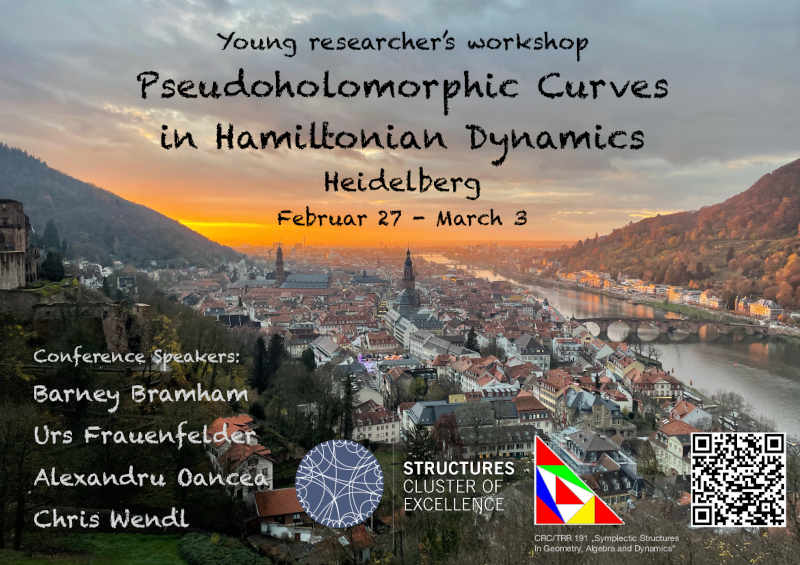Newsroom
Stay informed with our latest news and announcements on this page. For more in-depth content, we also encourage visitors to explore our bimonthly STRUCTURES Newsletter magazine, which features a variety of articles, interviews with members, and background information on our latest research and activities.
We are happy to announce the workshop “Pseudoholomorphic Curves in Hamiltonian Dynamics” taking place from February 27 to March 3, 2023 at the Mathematical Institute Heidelberg. The workshop is aimed at graduate students that are interested in the topic. The first three days we will work in small groups on some foundations of the field. On Thursday we will again in small groups look at some more recent papers (or advanced topics) and have a conference dinner in the evening. Finally, on Friday we shall have a small conference. Every participant will play an active role in the seminar - either by preparing a talk in the first part of the workshop or by presenting their favourite paper on pseudoholomorphic curves in Hamiltonian dynamics. The registration is open until February 03, 2023.
Weblinks: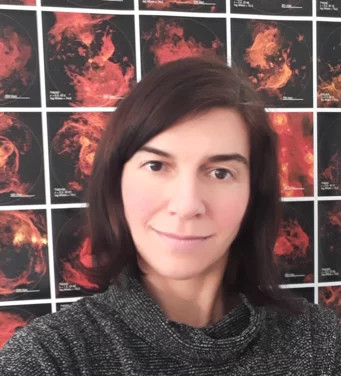 Annalisa Pillepich – Group Leader in the Galaxies & Cosmology Department, MPIA, STRUCTURES CP1
Annalisa Pillepich – Group Leader in the Galaxies & Cosmology Department, MPIA, STRUCTURES CP1The European Research Council (ERC) has awarded Annalisa Pillepich, research group leader at Max Planck Institute for Astronomy (MPIA), one of the prestigious ERC Consolidator Grants. In her project COSMIC-KEY, Pillepich and her colleagues will be developing the next generation of simulations of galaxies and of the universe as a whole – a key to understanding observational data that is set to become available over the next years.
The objective of COSMIC-KEY is to create the most realistic suites of simulations yet of galaxy formation and its consequences for cosmic evolution and cosmic structures. This includes, among many other physical phenomena, the influence of the central black holes not only on the rate of star formation in galaxies but, crucially, on the physical properties of the gas that surrounds galaxies and permeates dark-matter halos. The ultimate goal is to use such numerical and theoretical models to fit data of the X-ray and Sunyaev–Zel'dovich signatures of groups and clusters of galaxies and in turn to infer fundamental cosmological parameters that describe the functioning of the Universe.
With a total amount of 2 million euros, the consolidator grant will be used to finance 4 post-doctoral positions and 2 PhD students at MPIA over the coming five years.
Weblinks:In this week's IWR Scientific Computing Seminar on Friday, January 27, Nick Trefethen (University of Oxford) will give a talk at 15:15h in the Conference Room on the fifth floor of Mathematikon:
Title: Applications of AAA Rational Approximation
Abstract: For the first time, a method has recently become available for fast computation of near-best rational approximations on arbitrary sets in the real line or complex plane: the AAA algorithm (Nakatsukasa-Sete-T. 2018). We will present the algorithm and then demonstrate a number of applications, including detection of singularities, model order reduction, analytic continuation, interpolation of equispaced data, smooth extension of multivariate real functions, extrapolation of ODE and PDE solutions into the complex plane, solution of Laplace problems, conformal mapping and Wiener-Hopf factorization.
(joint work with Stefano Costa and others)
Time & place: Friday January 27, 15:15h, Mathematikon, 5th floor, Conference Room
Research: Simulations of Planetesimal Formation Reproduce Key Properties of Asteroids, Comets
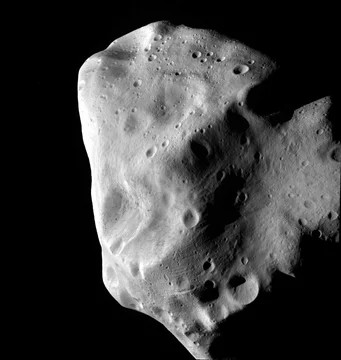
With simulations that resolve finer details than ever before, scientists Brooke Polak (Heidelberg University) and STRUCTURES member Hubert Klahr (MPIA, Heidelberg University) have modelled a key phase in the formation of planets in our solar system: the way that centimetre-size pebbles aggregate into so-called planetesimals tens to hundreds kilometres in size. The simulation reproduces the initial size distribution of planetesimals that can be checked against observations of present-day asteroids. It also predicts the prevalence of close binary planetesimals in our solar system.
Planet formation around a star proceeds in several stages. Initially, cosmic dust in the swirling protoplanetary disk around a new star clumps together due to electrostatic (van der Waals) forces, forming so-called pebbles a few centimetres in size. The pebbles in turn join together to form planetesimals: space rocks between tens and hundreds of kilometres in diameter. Finally, collisions among these planetesimals form even larger, gravitationally-bound, solid cosmic objects: planetary embryos, which can continue accreting planetesimals and pebbles until they become planets. Simulating this progression from centimetre-size pebbles to planetesimals, however, is challenging due to the disparate scales involved. The simulations by Polak and Klahr follow an innovative approach by using a kinetic description in which small groups of pebbles in a collapsing cloud in a protoplanetary disk are treated like a gas that can undergo certain phase transitions, and assigning a pressure to this “pebble gas.” In their new work, Polak and Klahr look at several versions of collapsing protoplanetary disk regions, each with at a different distance from the Sun, starting with a distance as close as Mercury's orbit and ending with a collapsing region as far away as Neptune.
Weblinks:The first SIMPLAIX Workshop on “Machine Learning for Multiscale Molecular Modeling” will take place in the Studio Villa Bosch in Heidelberg on May 2-4, 2023. Please register to participate and to submit abstracts for contributed talks and posters by March 15 at the workshop's webpage. The workshop is organized by Rebecca Wade (HITS), Andreas Dreuw (IWR), Frauke Gräter (HITS), Fred Hamprecht (IWR), Ganna (Anya) Gryn’ova (HITS), Marcus Elstner (KIT), Pascal Friederich (KIT), Ullrich Köthe (IWR).
SIMPLAIX is a newly established cooperation between the Heidelberg Institute for Theoretical Studies (HITS), the Karlsruhe Institute of Technology (KIT) and Heidelberg University, focused on bridging scales from molecules to molecular materials by multiscale simulation and machine learning. The aim of the workshop is to bring together scientists working in the field to share their research and discuss current challenges.
More information:
SIMPLAIX Workshop 2023 - Heidelberg Institute for Theoretical Studies (HITS)
We are delighted to announce the launch of a new recurring series of talks and events on Scientific Machine Learning. The series kicks off on Thursday, January 19th 2023 from 16h30 to 18h00 at Mathematikon (INF 205, Conference Room, 5th floor). Machine Learning galore will feature lab presentations by PIs as well as scientific talks by junior scientists:
Machine Learning galore! - Programme:To help plan the catering, please register for free by clicking here.
- Lab presentations:
- Tilman Plehn, Rebecca Wade, Bernhard Höfle, Jakob Zech
- Science talks:
- Stefan Radev (Köthe lab): Modeling Uncertainty with Neural Networks
- Theo Heimel (Plehn lab): Normalizing Flows for LHC Physics
- Annika Reinke (Maier-Hein lab): Pitfalls and recommendations for image analysis validation
Scientific Machine Learning is a joint initiative from STRUCTURES and IWR aimed at fostering interactions within and development of the local machine learning community. Its portal, http://mlai.uni-heidelberg.de summarizes the many relevant events and news from across campus that would otherwise remain scattered across single institutions or fields.
The goals of this new platform align with the STRUCTURES Cluster of Excellence's objective of driving research into the fundamental understanding of current and future machine learning, and with IWR’s aim to leverage machine learning to enable the solution of long-standing problems in the natural and life sciences, the engineering sciences, as well as the humanities.
Further information and links:
- Scientific Machine Learning (MLAI) homepage
- Machine Learning Talks on Campus – Information service and mailing list
- Interdisciplinary Center for Scientific Computing (IWR)
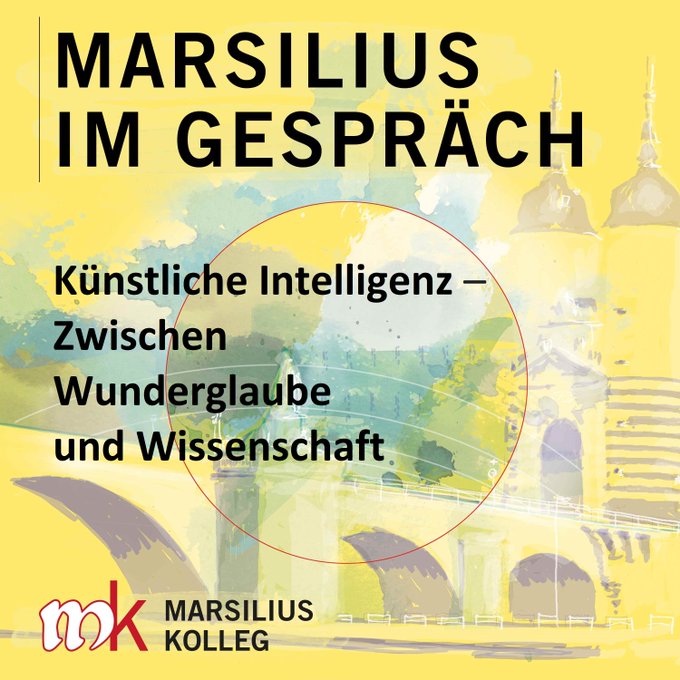
In the new episode of Marsilius im Gespräch, the Podcast of Heidelberg's Marsilius Kolleg, Friederike Nüssel talks to Andreas Dreuw (Chemistry), Robert Scheichl (Mathematics, STRUCTURES Cluster) and Jan Schuhr (Law) about chances, limitations and risks of Artificial Intelligence (AI). During their time as Marsilius Fellows, the three scientists have been working on an interdisciplinary project Künstliche Intelligenz: Zwischen Wunderglaube und Wissenschaft.
The Marsilius Kolleg at Heidelberg University bridges the gap between sciences and humanities through meetings and joint projects, which in turn promotes understanding and cooperation between the sciences and the humanities. Founded in 2007, the Marsilius Kolleg is a central component of Heidelberg’s successful proposal granted by the Excellence Initiative, launched by the federal and state governments of Germany.
Weblinks: